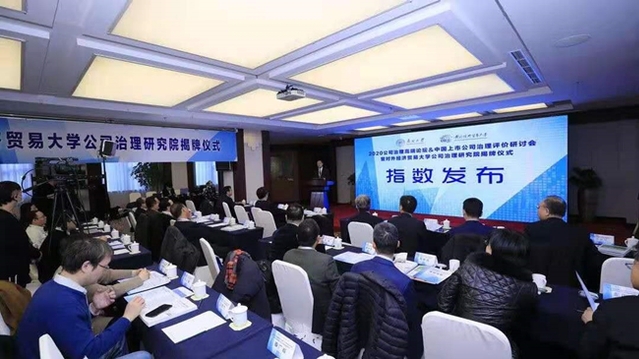The 2020 Corporate Governance Index of Chinese Listed Companies (CCGINK) Released in Beijing

On the 5th of December, the 2020 Corporate Governance Summit Forum and the Evaluation Seminar on Corporate Governance of Chinese Listed Companies were hosted in Beijing by the China Academy of Corporate Governance of Nankai University and the Business School of the University of International Business and Economics (UIBE). More than 200 experts, scholars and industry insiders have participated in the event; these luminaries are from the Development Research Center of the State Council, the Chinese Academy of Social Sciences, the Research Center of State-owned Assets Supervision and the Administration Commission of the State Council, Nankai University, the University of International Business and Economics, the University of Geneva, Northwestern University, and so on. Liang Qi, a member of the Party Committee of Nankai University, delivered a speech at the opening ceremony, and Li Wei'an, chair professor of Nankai University and the President of the China Academy of Corporate Governance, released the 2020 Corporate Governance Index of Chinese Listed Companies (CCGINK) and the 2020 China Corporate Governance Index (CGGI) on the spot.
Corporate governance is the foundation and forerunner of the modernization of China’s governance system and capacity for governance. The world today is undergoing profound changes unseen in a century and the current main tasks for those who work on corporate governance’s principles and practices are how to improve the performance of corporate governance, as well as to prompt and support high-quality development of the economy by advancing the transformation of corporate governance. The official implementation of the new Securities Law and the reform of the registration-based IPO system on ChiNext has further urged on the need for economic governance and autonomous governance of listed companies. The State Council recently issued Opinions of the State Council for Further Improving the Quality of Listed Companies, meanwhile the China Securities Regulatory Commission (CSRC) has initiated special actions on corporate governance, marking the entry of Chinese listed companies into the stage of corporate governance 2.0 with a focus on more improvement of effectiveness .
3,753 companies have been chosen as the evaluation samples for the Corporate Governance Index of Chinese Listed Companies, of which 1,864 are listed on the mainboard, 925 on the SME board, 786 on the ChiNext board, 70 on the science and technology board, and 108 in the financial sector. The result of the China listed company corporate governance shows that the overall performances of a listed company’s corporate governance have been improving during the period 2003-2020. It reaches a new high of 63.49 in 2020, up 13.87 from 49.62 in 2003; however, the growth rate has slowed in the last two years, increasing only 0.17 and 0.30 percent. The levels of shareholder governance, board governance, supervisory board governance, managerial governance and stakeholder governance all show an upward trend, while the level of information disclosure has slightly decreased.
The 2020 Green Governance Index of Chinese Listed Companies disclosed in this seminar is called “the upgraded ESG”, which is the continued application, by the China Academy of Corporate Governance, of the Green Governance Evaluation System after the release of the Green Governance Index of Chinese listed companies in 2018 and 2019. The overall evaluation samples are 987, 653 on the main board, 160 on the SME board, 74 on the ChiNext board, 8 on the science and technology board, and 92 in the financial sector. The Green Governance Evaluation results of listed companies show that the average value of the Green Governance Index is 55.78, an increase of 0.27 from 2019, implementing green governance in its beginning stage. Green governance responsibility has the highest average value of 58.88, indicating that listed companies have performed better in external green activities such as green public welfare, and have a stronger sense of social responsibility and inclusiveness; green governance effectiveness comes second, with an average value of 56.90, indicating that listed companies have made certain improvements in energy conservation, emission reduction and recycling; while the average values of green governance structure and green governance mechanism are relatively low. This reflects the weakness of listed companies in the top-level design of green governance mechanisms and structures, which are in need of improvement.
It is reported that, the Corporate Governance Index of Chinese Listed Company (CCGINK) (also known as the Nankai Index), as the national earliest published index reporting the governance situation of Chinese listed companies, has been continuously published for 18 years since 2003, and has accumulated 38,169 sample companies. The index has had a great impact at home and abroad, and has been fully recognized by the State-owned Assets Supervision and Administration Commission of the State Council (SASAC), the Chinese Banking and Insurance Regulatory Commission, the Chinese Securities Regulatory Commission and other relevant departments, and is widely used in both the academic or practical realm. CCGINK is also applied in the evaluation of corporate governance in Shenzhen and other regions in the realization from research results to real practices.
(Contributed by China Academy of Corporate Governance of Nankai University, Translated by Meixu Wu, Edited by STEFAN SARAH DANIELLE and JianjingYun)









